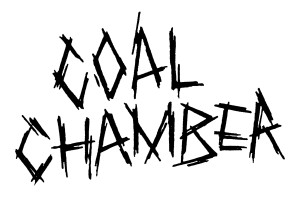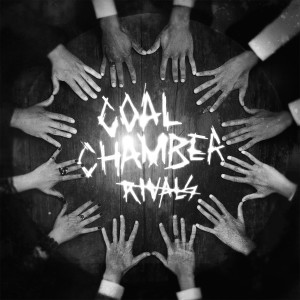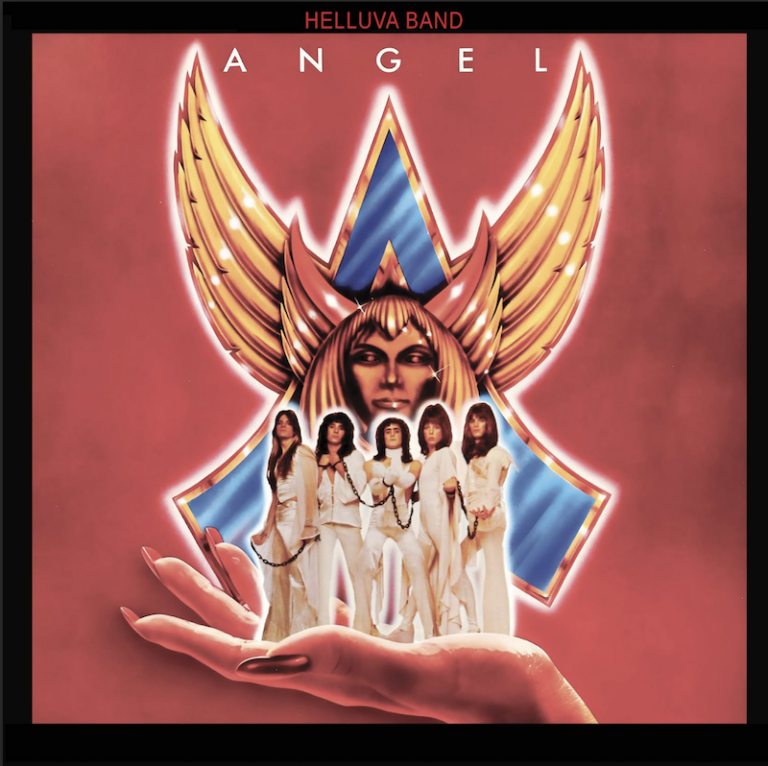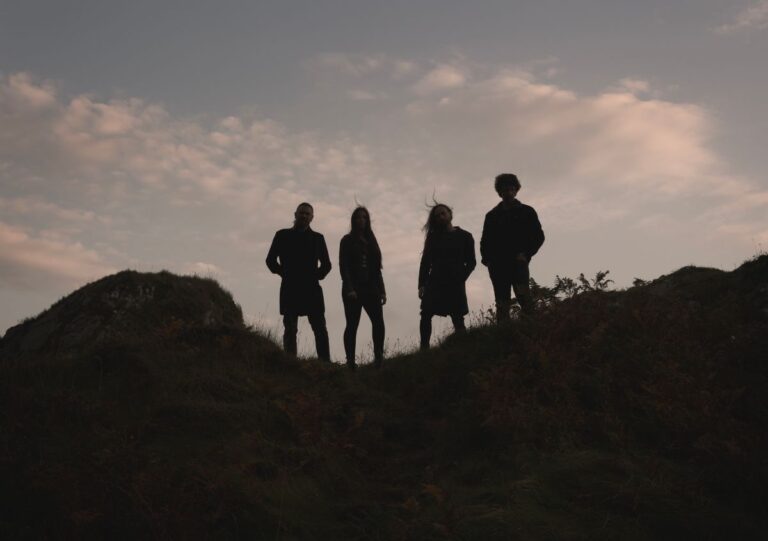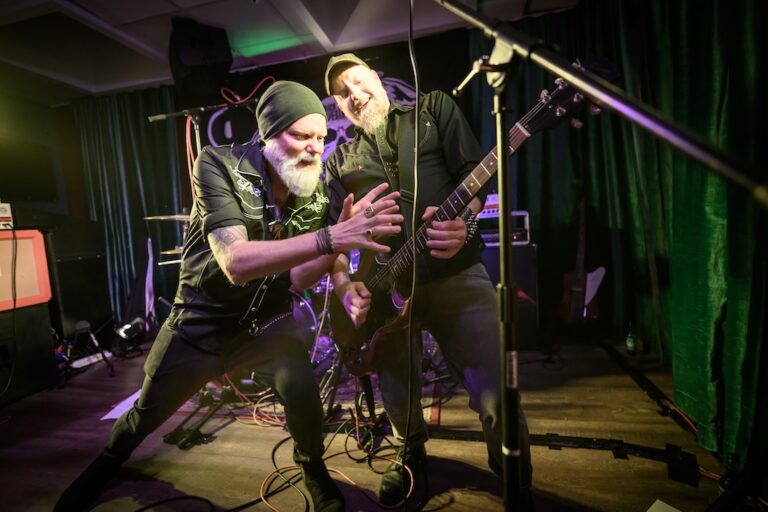At their peak, Coal Chamber were everywhere. You couldn’t move for pictures of the band, who, clad in their often outrageous and day-glo garb, stared out, bug-eyed, from the covers of magazines and papers. In an age before the internet really took off (we were still on dial up back then), it was the magazines that could make or break a career, and the press took to Coal Chamber like flies to the proverbial. It also helped that the debut coal chamber album featured a dark, surreal assortment of songs and at least two skull-crunching classic anthems in the form of ‘sway’ and ‘loco’, the latter being further enhanced by its heavily played video clip. It’s not clear where the downward slide began. The reviews for ‘chamber music’ seemed less enthusiastic for sure (although in my mind it was the better album), and the ensuing tour saw original bassist Rayna replaced, initially for maternity reasons and then permanently by Nadja Puelen.
All was not well in the band, however. Despite a more brutal sound than ‘chamber music’, ‘dark days’ was not so well received publically (the press having grown tired of nu metal) and the band were fighting internally, the turmoil eventually leading to an onstage fight between Dez Fafara and Miguel Rascon and the Coal Chamber vehicle ignominiously ground to a halt, seemingly forever. Dez went to form the critically acclaimed Devildriver, and nu metal gained unfair pariah status, in part a furious over-reaction to the oversaturation of the genre by mediocre bands.
That Coal Chamber should reform seemed unlikely to say the least, but over the years the tension eased between Dez and Miguel and in 2011 Coal Chamber returned with Mike Cox, Dez Fafara and Miguel Rascon back in the fold, although the initial shows featured Chela Rhea Harper on bass. Progress was slow as Dez maintained his commitment to Devildriver but in 2013 Nadja re-joined the band and work on a new album began. He result, ‘rivals’ (reviewed last week), is a furious reassertion of the Coal Chamber sound and we were lucky enough to get hold of Dez Fafara to talk about this most unlikely of reunions.
When Coal Chamber first arrived you got a huge amount of critical acclaim and built a huge fan base, but by Dark Days you seemed to be struggling to communicate within the band and the press glow had worn off. Is this reunion a chance to re-evaluate what made the band special in the first place?
Oh one hundred percent. We started talking in 2006 and again in 2009 and it took us until 2012 to tour together. I think no one in their life wants to live with regret and we had had such a tumultuous break up, we had so much inward turmoil in the end. The things that did break us up slowly got taken care of when it came to their lives – the rest of the guys in the band’s lives you know – and it’s watching everyone mature – the drummer is sober with a one year old baby boy and watching all of this and hearing the music that they were writing and hearing that it was mature, it was different, it sounded fresh to me and I was intrigued, I was intrigued.
But the thing about Coal Chamber getting back together, right, and it needs to be resoundingly clear – what people need to take out of this whether they like our music or don’t like our music or whatever – what they need to take out of it is that if you have a chance to make up, get back together with somebody that you lost a friendship with; if you got fired from a job rightly so and you have a chance to go back and tell the guy “hey, thanks for firing me because I got my shit together”; an old girlfriend that you had a horrible break up with – I think if you have a chance to make up with someone, I think it’s important that you do it for Karma, for life, it’s important why you do it. That’s why this is all happening, we didn’t want to live with the regret of what happens every day – we just wanted to do it.
The one thing that the press, and the public to a certain extent, love more than success is dissolution and failure. Do you think in the intervening years some of the things sad were exacerbated by the press and by the negativity that surrounded the break up?
Absolutely, but I’ve always been quite clear and absolutely honest with everybody about what did happen. You know I watched almost the whole genre take a fall with people talking ill of nu metal etc… Now you look at the biggest bands on the planet – you know, Slipknot, Korn, System of a down, Deftones – those are all nu metal bands so it kinda never went away. The thing is you have to realize that the press does feed off that kind of negativity and you have to have a very thick skin in this industry and people know that you can’t always believe what you read. But I’ll always go ahead and spit the truth out and the truth is that we broke up because of every single rock and roll cliché that there’s ever been around. They got on some very hard, heavy drugs and everything from drugs and alcohol to money and ego to women constantly living on the tour bus and getting involved in our business, it all broke us up. Everything, all of that. It took apart. And I’m just glad that I left when I did because I believe it saved Meeg’s and Mike’s life and now, coming back in and watching them mature, watching them as adults and hearing them make good music and having their head on straight, their shoulders up and ready to go on tour and make good music – ah there’s nothing better! There’s nothing better than feeling that.
Did the press take a million stabs? Oh absolutely. When you read things… when I left coal chamber and I got devildriver going… and you read the press and you just go “really? I’ll show you!” That’s really how I’ve always felt. Somebody said after Devildriver’s second or third record, after I left Coal Chamber, they said “from zero to hero now,” and I was like “ wait a minute… hold on… what about the cover of every magazine and the gold records in coal chamber… there was no ‘hero’ at that point?” I hated the way that things get turned around… but you know what the press loves more than failure and watching it all fall apart, because they do get off on that, people really do get off on that… they love even more a good come-back story. And when it’s a positive one, like coal chamber, the record is phenomenal and it’s all I’ve been hearing for 300 interviews now so I’m quite sure of myself at this point, right, when you start hearing “hey we’re glad you guys took a chance with it” then you know the press is going to love that too. There’s nothing better than a strong comeback especially when it’s as on top of the world and positive as this one is.
When you talk about positivity, one of the things that turned me onto Coal Chamber in the first place was that, although your lyrics are very varied, they’re often very positive. I remember on ‘Chamber music’ there was a song, ‘Tyler’s song’ which was very heavy but written for your son and which contained very uplifting, emotionally honest lyrics. The perception about heavy metal, from the outside, is that it contains very angry, very negative lyrics, is it important to you to show that the music can be very loud and aggressive but that the lyrics could contain a strong, positive message as well?
Oh absolutely. Often its misconstrued because of the means the artist uses, which is heavy metal. I’m definitely a glass is half full kinda guy and I’m definitely a positive lyric kind of guy and if it comes out like it’s anger or negativity then it’s absolutely false and wrong. One guy said to me about the new record “some of your songs sound so angry!” and I asked them which ones sounded angry to them and they said ‘bridges to burn’ and I had to explain that that song is far from angry. That’s a sad song. That’s like watching somebody walk away after being with you for ten years and all the bridges that they burned now affecting how they can’t get on with their life. That’s a sad song. And they were like “oh, ok, I get it.” And what I find in heavy metal, or any underground stuff, punk rock, the goth scene the heavy metal scene – most of these people are more artistic, more thoughtful, more perceptive, more in tune with what’s going on in the world than most of the outsiders even know. So, yeah, my lyrics have always been very personal, very introspective and I really strip myself, go ahead and give it all and when I stop that I think I’ll stop writing. That’s the truth of it.
The other thing about Coal Chamber, and a lot of nu metal in general, was that there was a very strong visual style that went along with the music and I remember that back when the first album came out I looked at the band and I was, I guess, sixteen when that first record came out and it was like “wow, that’s cool!” Is the visual theme something that’s still important to you in how you present the band?
When we started, when we first came out of LA, everyone had to do something to look strange and to get out of there. Are we carrying that on now? Yeah – if you look at the press shots, Mike and I have something going on and me, apart from my hair being really long, I don’t really dress any different than I used to – it’s black this and black that – it goes from wearing a band shirt or whatever, and oftentimes I do do some crazy stuff on my face when I’m in Coal Chamber as well, and it’s a bit like war paint, you know big black lines across my eyes or whatever. I think there’s an evolution going on, definitely, in the music. We didn’t want to make any kind of nineties throwback record, we didn’t want to be part of any nostalgia trip whatsoever. We actually demoed a couple of songs back in 2009 together and when we listened back we realised that it just sounded like Coal Chamber, there wasn’t anything fresh going on, so we decided not to do it, a lot of people don’t know that. But yeah, the imagery was a big thing for all of us back then and the bands that came out of that era with us, that were in the nu metal genre before a lot of bands started coming in and calling themselves nu metal too… we were like, “nah, that’s just our scene.” Because what were all doing was metal and it was new… we all still really hung on to that image as well – if you look at Korn or slipknot or System of a down, we’re all still holding on to the image of our youth, so I think it’s part and parcel although there is an evolution to it within Coal Chamber’s frame of reference.
You’re now doing double duty with Devildriver, a hugely successful band of the last decade, and Coal Chamber, of course. Do you have to approach the writing in a different way – do you look at it from a different mind-set for each band or is it, in each case, Dez doing his thing?
Right, good question. Lyrically I don’t approach it any different. I still love to write at four thirty in the morning when it’s still dark out and the world’s totally quiet – it’s my favourite time. So writing the lyrics has not changed. But the delivery of the vocals is definitely different. There’s huge melodic choruses, but they’re still not clean. They’re heavy and grindy – I can… with Coal Chamber there’s a whole different palette of colours that I can use, that I haven’t used… but I also can do those same things with Devildriver – high screams, low screams – I can still do that, but there’s also the clean stuff, talky stuff, screechy stuff, different layered stuff. Verses like on ‘rivals’ for instance, wouldn’t work with Devildriver. But Devildriver’s always been… the thing with me, when it started it, it always had to have the sharpest claws and the sharpest teeth in the room. I wanted to be the band that wasn’t afraid to go on before or after anybody, and that’s the band Devildriver’s built itself to be. It’s a monster on stage, and Coal chamber’s a very different thing. Very sharp claws and very sharp teeth, but we’ve got other things happening as well. And those differences are really what made us in the beginning. We were the only band form that whole era that combined everything that was goth, from Bauhaus and the damned to the cure etc… to punnk rock on stage and punk rock lifestyle, for sure offstage, with heavy metal. It’s those combinations of things and them usic we listened to that makes coal chamber something special. It has a very unique thing so…. Long answer to a short question.
Coal Chamber seemed to suffer from the fact that what was promoted – through the singles for example – was always the heavier stuff, but on record it was much more diverse and there was always that goth, synth edge ( in songs like the Peter Gabriel cover ‘shock the monkey’) that other bands like Korn, whom I also like very much, but they didn’t seem to cover that ground till a bit later and that was always very interesting to me.
Right on, we always had that sensibility and we still do to this day. I woke up this morning with my wife and we listened to the damned and we’re just kicking back here, getting the kids ready for school etc… and I like all kinds of music and I think the rest of the guys are like that too and that’s what’s always made us have something different. In the time when we did those songs too – that cover of ‘shock the monkey for example – we always did things that were a little against the grain, that made metal purists crazy and that’s part and parcel… that’s what comes along with being in Coal Chamber. I have no room for purists, even when I do a Devildriver record I have no room for purists and we always like to push the boundaries and do something different and do a song like ‘Tyler’s song’ and I’m glad I did that song for my kid now, you know, because he’s twenty-three years old, he’s getting married next month and when we did that he was nine years old and getting beat up at school and that really sucked. I fucking hate bullies.
That was always a really strong theme – looking out at the world and finding inner strength and inner conviction.
Yeah, I come from that because my world as a child wasn’t exactly great and I ran away several times and slept under bridges and, you know, stole food at the nearest store and fought bums at night in Hollywood and it wasn’t a great upbringing. But I never bitched about it in my music, and a lot of bands did. I tried to give strength, through my lyrics because that was the only thing that got me through. It was being positive, getting strength, knowing that you’d come out of whatever and I carried that out in my personal life. If I was going through hardships or friends around me were going through hardships, I always tell people not to worry because the coin will turn. And I turn to get that, lyrically, a lot. Either that or I really, really try to write lyrics that connect with people because music that is so diverse that we have an opportunity to connect with people.
You had Ozzy guest on one album and Al Jourgensen is on this album – how do you go about the process of getting someone to work on an album?
Oh man, that thing is so weird, I don’t know how to explain that. It never happens like you plan it, never and I’ve been so fortunate. First of all I’ve never lost a feeling about working with an artist, from when I was a young kid, I was in awe of any of the artists I’ve worked with and I’ve been so fortunate, over my career, to work with guys like Ozzy or Nikki Six, Max Cavalera, or even new cats like Liam from the Cancer Bats. It’s, how do you say it. It’s really enjoyable, as a vocalist, to be able to work with somebody else and the way that we got into working with Al was that he’s been a long-time friend, a progenitor of a scene – I mean starting industrial music, you wouldn’t have NIN and Marilyn Manson etc… etc… without Al and he’s one of the guys who really understands what I do within Coal Chamber and he knows that it’s as much goth as it is punk rock as it is metal and who else can understand those three combinations besides AL Jourgensen, right? And he’s recently moved to California and my wife had been for dinner with him and his girl, hanging out at his house late and night, and I was like “look, I’m doing a record, it’s a coal chamber record, you definitely know what we’re all about there. Here’s the song, it’s called ‘suffer in silence’, it’s about having something to say to somebody for so long that you finally end up exploding inside yourself because you didn’t bring it out in time” and he was in straight away. We sat down, we made an Italian meal, we drank some red wine and listened to him getting his signature vocal tone, hearing ministry coming out of the speakers in my home studio, basically, it was a fuck you moment! You could have punched me in the face at that moment and I would have just been listening and breathing, I wouldn’t even have moved… so, it’s an honour man, any time you can get together with any of those guys that I just mentioned, it’s a pretty honourable moment.
Listening to you talk now and with the interviews I’ve read over the years, it’s clear that you’re someone who’s just so incredibly passionate about music – are you still excited to explore new music and hear new bands and so on?
Oh man, yeah, I’ve got my ear to the ground, I can tell you all the newer bands coming up before they’re even signed, especially as I have a seventeen year old and twenty year old living with me and all we do is listen to music as well. But the thing is, I never left behind the person that was a brick layer who worked on a construction site and had to wake up at five in the morning, I never left that behind, so I feel lucky every single day and I’m creating art and working with artists that I’ve listened to do every single day of my life and I’m friends with the guys I listened to on the way to work. I mean, Glenn Danzig came up to a show, a coal chamber show in LA and he knows how I feel about him and he took us on our first run ever and I told him at that show that I used to drive to San Diego and back – it was an hour and a half drive – when I was a brick layer and all I used to do was listen to the first Danzig record and I used to dream. I’d see a tour bus go by and I’d be “what’s that like?!” You know, I had cement all over my fucking face and it’s like “what are they living like?” and I told Glenn that it was an honour to have him at the show and that it was so gracious of him and he said the same thing – he said that the thing about me is that I never change, and I’m never going to. I’m never going to let… I guess when people get on stage they develop ego and it’s just a… don’t get me wrong, the ego, the id, that thing should only be for the hour / hour and ten minutes when you’re on stage and maybe a few minutes when you come off stage because it’s hard to shake that guy. But after that, don’t take that into your personal life and your friendships and your marriages, like no one cares! You’re not… the fucking singer up there right now, you’re just at home making dinner, you know what I mean? A lot of people say that I probably picked the wrong industry because I’m extremely reclusive, I’m extremely private – I’ve got a group of friends so small I can count on one hand and I really don’t do the back stage / go to the strip club kind of thing – I don’t care about any of that. I’m in it for the music and for the stage and all the other stuff around it, I’m not into it and that helps you to keep grounded and helps me to look at everything I do from an outside perspective and I’ll always try to keep that perspective strong.
That passion is really important, and it’s what drew a lot of people, I think to Coal Chamber in the first place…
You haven’t heard the new record yet, I think, and I can tell you you’re going to love the new album. It’s like where did you leave off? What does it sound like? Does it sound like ‘chamber music’? Does it sound like ‘dark days’? No, it does not, it’s a total evolution and there are so many little moments within ‘rivals’ that you’re going to love. There’s a song like ‘Orion’, it’s like a minute and a half long, clean vocals, very mellow… very mellow it’s like, gothy beyond gothy. Then there’s all sorts of different moments in this record that really define who we’ve become over thirteen years. And the thing we didn’t want to be part of… I’ve said it before, and it’s one thing I do repeat in interview – we didn’t want to part of some throwback nostalgia trip, and the fact that I’ve done three hundred interviews and the most cynical guys are emailing me on the side saying they can’t believe the record, or they can’t stop listening to it. So those kind of things make you feel really good and I can’t wait for you to hear the record, especially if you were a fan of us back in the day. You’re going to love where we went now.
In all honesty, I’m holding off until the record comes out – I’m a physical records geek, I have a record collection destroying the foundations of my house, and I’m just looking forward to listening to the real thing when it comes out…
Right on! That is definitely meant to be listened to all at once and it is one of those records that, when you get to the eleventh or twelfth song you immediately push play again because it’s not long, it’s not a very long record, it’s only forty minutes long and it has a lot of different moments in it and I think… I think we came together and we captured something really special. The artwork for ‘rivals’ says that – if you look at the art work, it’s hands joining to do invocation, to do magic, and that’s like an analogy for the inside of the record. For us coming together again, to join hands, to create magic together and I think we did it. We took a lot of flak it’s not something that you ignore when you take heat form magazines or people who have put you on a pedestal and when you leave they take their moment to take their fucking shot. We wanted to make sure when we came back, we’d come back so strong and so full on that there’s be nothing left to be said, and I think we’re doing that. That’s where we are right now with ‘rivals’ and it’s going to put a sock in anybody’s mouth, that’s for sure, and It’s important… it’s important.

